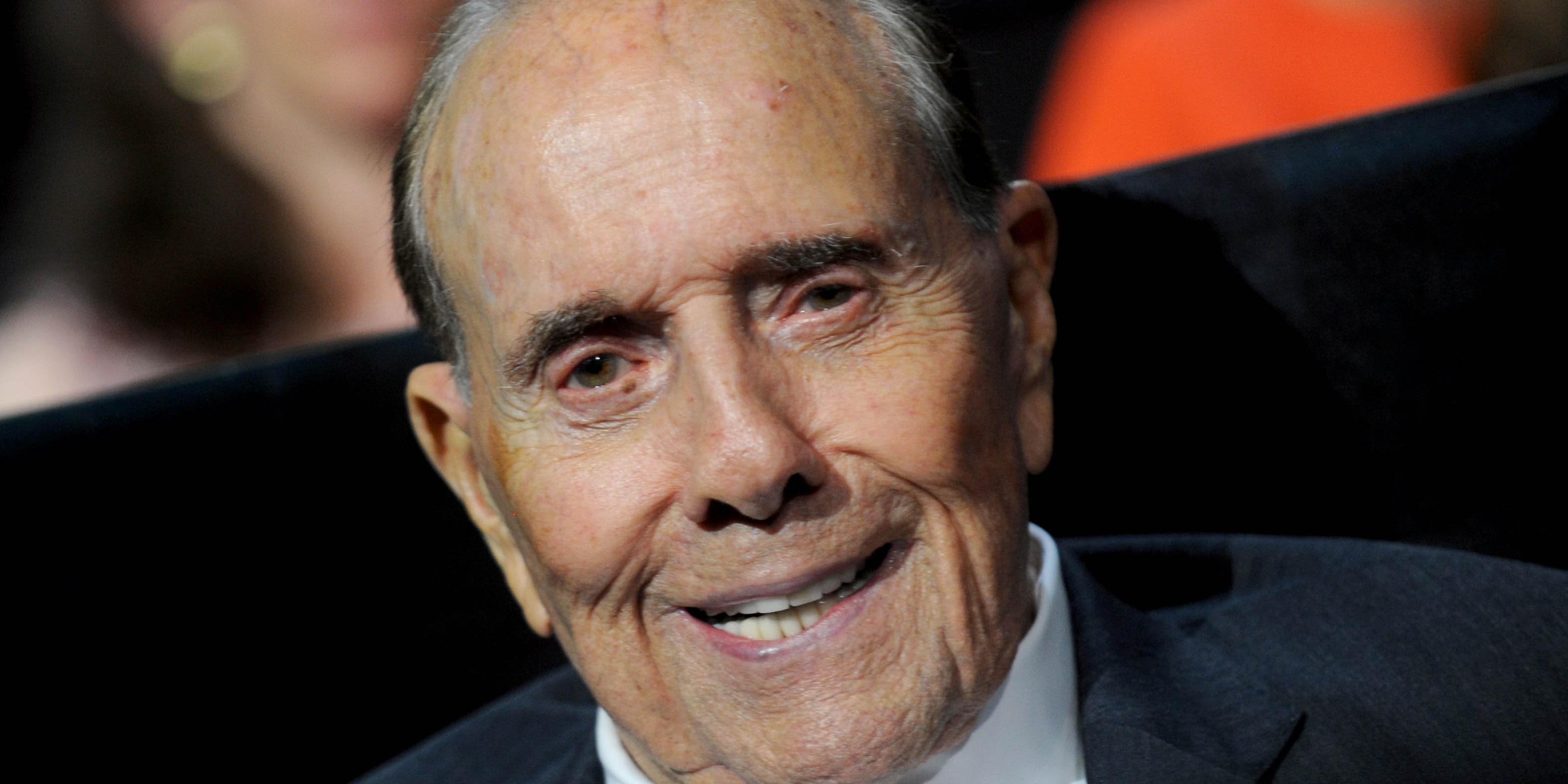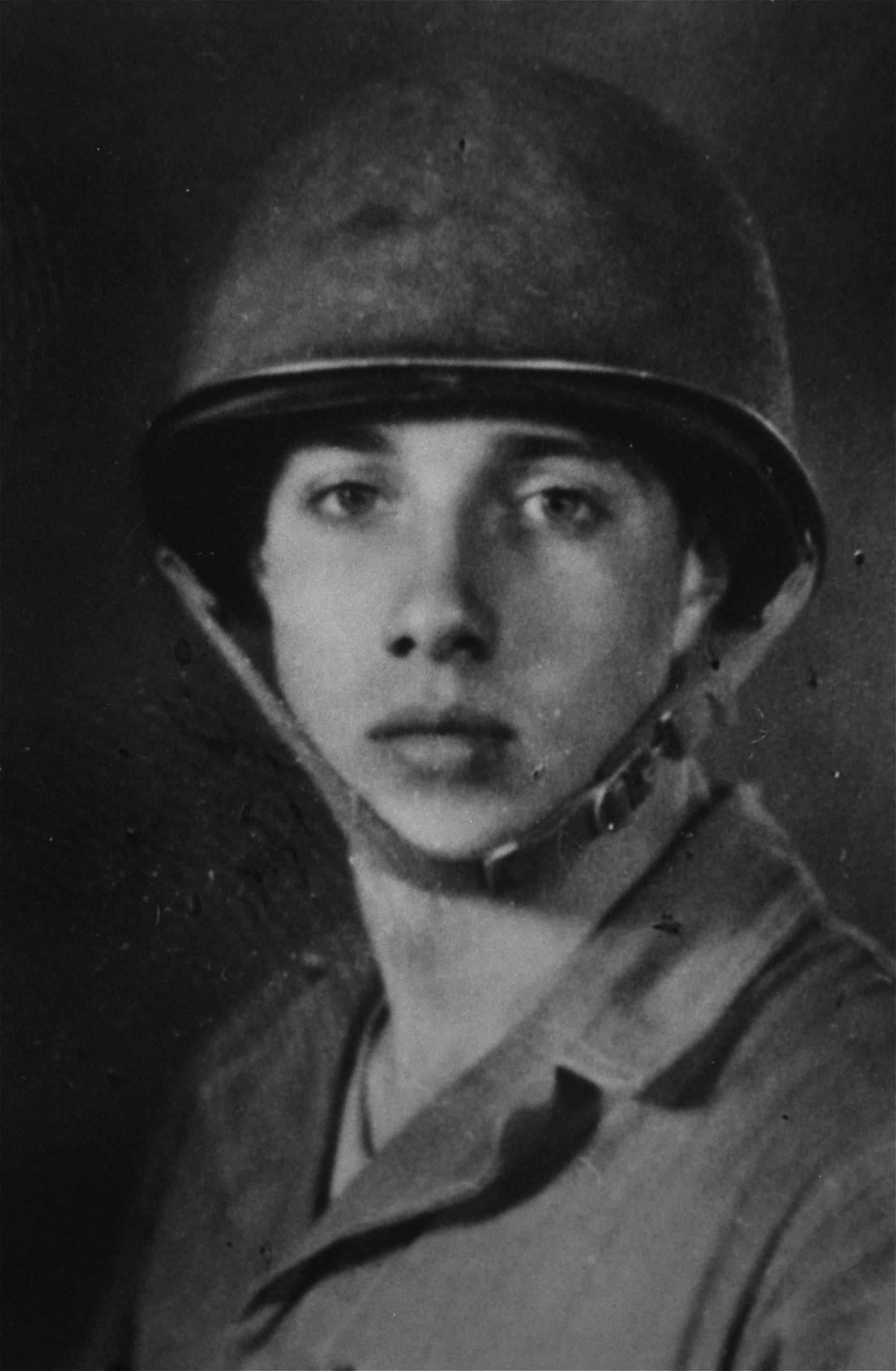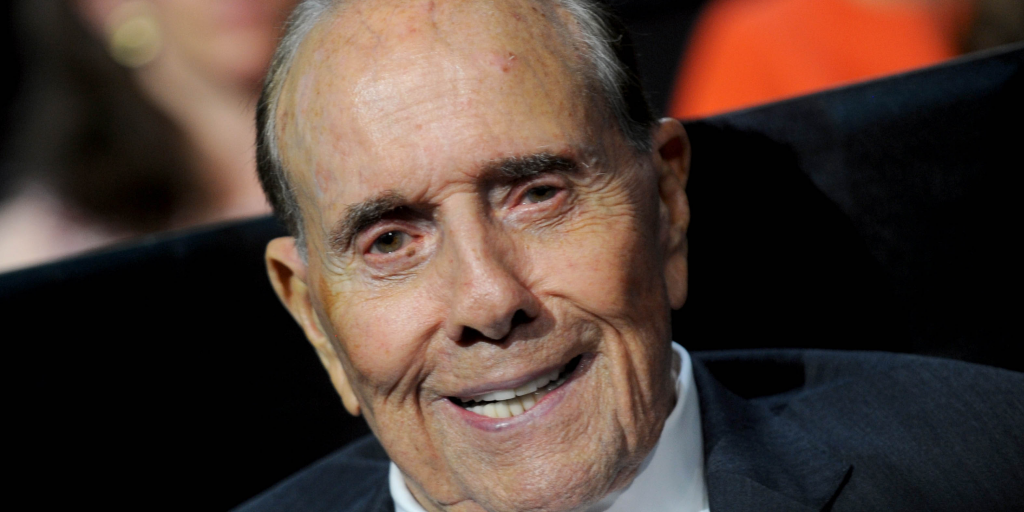
- Former US Sen. Bob Dole died on Sunday at the age of 98.
- Dole, a decorated veteran of World War II, was the GOP presidential nominee in 1996.
- He was first elected to Congress in 1961 — the start of a long career in politics.
- Visit the Business section of Insider for more stories.
Bob Dole, the former US senator and Republican presidential nominee, died on Sunday at age 98.
He is survived by his wife of over 40 years, Elizabeth Dole, and his daughter, Robin.
In February 2021, Dole at the age of 97 announced that he'd been diagnosed with stage four lung cancer and would soon begin treatment. "While I certainly have some hurdles ahead, I also know that I join millions of Americans who face significant health challenges of their own," Dole said in a statement at the time.
Dole rose from humble beginnings in Russell, Kansas, to become one of the longest-serving Republican Senate leaders in history, surpassed only recently by Sen. Mitch McConnell.
He served in the US Army from 1942 to 1948 and was awarded a Bronze Star and a Purple Heart for his service in World War II. He was badly wounded in Italy in 1945 by German fire, which left him with permanent limited mobility in his right arm.
Dole was first elected to Congress in 1961 and ran for president multiple times before becoming the GOP nominee in the 1996 election, when he lost to Bill Clinton.
Politico once described him as "among the last living reminders of an era in Washington when bipartisan cooperation on big issues like Social Security and civil rights was common, and the blood sport of politics was set aside at the end of the day in favor of a shared glass or two."
Early life
Dole was born on July 22, 1923, to Bina and Doran Ray Dole.
His father ran a creamery, and Dole worked at a drugstore in Russell when he was in high school. Dole's biographer Richard Ben Cramer wrote in his book, "What it Takes," that Dole "had always been working, always been serious." He worked at the drugstore every day after school and on Saturdays.
Dole was also a high school athlete. He ran track and played basketball and football, and was voted "Ideal Boy" his senior year, according to Cramer's book.
Dole enrolled at the University of Kansas in 1941 as a pre-medical student. He continued his track, football, and basketball careers there and joined the Kappa Sigma fraternity.
Service in World War II

Dole's college career was interrupted by World War II. While he was still in school, he signed up for the Army Enlisted Reserve Corps.
He attended Army Engineering School in Brooklyn, New York, and then was sent to Fort Breckenridge in Kentucky to become an antitank gunner. He applied for officer training in 1944 and was deployed to Italy, near Rome, at the end of that year.
Dole joined the 85th Mountain Regiment, Third Battalion, and led a platoon as a lieutenant in the 10th Mountain Division.
On April 14, 1945, before he'd had much exposure to combat, he and his platoon of about 40 men were pinned down by German fire, and Dole was hit while dragging his radioman to cover.
"Some high-explosive bullet entered my right shoulder, fractured my vertebrae in my neck," Dole recounted in a campaign video, according to Military.com. "I saw these things racing — my parents, my house. I couldn't move my arms, my legs."
Dole was not expected to survive his injuries, but he eventually recovered after years of rehabilitation, although he was left with permanent limited mobility in his right arm. He often held a pen or rolled up pieces of paper in his right hand to hide his injury.
Dole met an occupational therapist, Phyllis Holden, at an Officers' Club dance at Percy Jones Army Hospital in Battle Creek, Michigan, and went on to marry her. They had one daughter together and later divorced.
Dole was eventually awarded a Bronze Star for his heroism.

Congressional career
Dole started his political career in 1950. He ran for the Kansas House of Representatives as a Republican while he was still a 27-year-old law student with no political experience, according to The Wichita Eagle.
He then became a prosecuting attorney for Russell County. Eight years after that, in 1960, he was elected to the US House of Representatives where he served four terms before becoming a senator in 1968. In 1971, he took on a second job as chairman of the Republican National Committee.
Dole's notable accomplishments include bipartisan legislation on the federal food stamp program, voting rights, and healthcare. But he also had a reputation as a political "hatchet man." CNN has referred to Dole as "the quintessential Washington insider," and Politico has noted his "eye for the jugular."
Dole represented Kansas in the House for eight years and in the Senate for more than 27 years.
In January 2018, Dole was awarded a Congressional Gold Medal, the highest civilian award Congress issues, "for his service to the nation as a soldier, legislator, and statesman." He's the eighth senator to receive the medal.

Presidential ambitions
Dole tried for the White House four times. He was President Gerald Ford's running mate during the incumbent's unsuccessful 1976 bid, then ran for the Republican presidential nomination himself in 1980 and lost to Ronald Reagan. He ran for the nomination again in 1988, this time losing to George H.W. Bush.
Dole was eventually successful in 1996, winning the Republican presidential nomination while he was the Senate majority leader. He ran against incumbent President Bill Clinton.
Dole gave up his Senate seat and his position as majority leader to run. The New York Times called Dole's 1996 presidential bid "one of the most ineffectual presidential campaigns in recent memory."
"Always the legislative tactician, Mr. Dole, according to his close associates, approached the presidential race much as he did a congressional negotiating session, believing that the key to victory was a clever endgame strategy," The Times wrote. "But so bleak were the polls, and for so long, that Mr. Dole was forced to realize, far earlier than most losing candidates, that the endgame would probably not be enough."
The Times described Dole's reported assessment of what went wrong with his campaign: "He was upset about the embarrassment of the bungled attempt to win Ross Perot's endorsement. He was mystified by the states his campaign had sent him to visit. He was unhappy with the television advertisements. He was convinced, in short, that the presidency was about to escape him yet again."
Dole eventually lost the race to Clinton, effectively ending his political career.
In keeping with his reputation for fostering bipartisan friendships, Dole told The Washington Post after his election loss, "People were urging [me] to be a hatchet man against Clinton for the next four years. I couldn't see the point. Maybe after all those partisan fights, you look for more friendships. One of the nice things I've discovered is that when you're out of politics, you have more credibility with the other side."

The salute
Dole made headlines when he stood up from his wheelchair to salute his one-time political rival, former President George H.W. Bush, at Bush's 2018 funeral, an emotional, powerful moment, particularly given the history the two men share.
Bush, like Dole, was a war hero and served with distinction in World War II. Dole saluted with his left hand because of the injuries he sustained during the war that affected his mobility in his right.
Dole was widely praised for what would be one of his final gestures of setting political rivalries aside in favor of civility.
Dit artikel is oorspronkelijk verschenen op z24.nl
